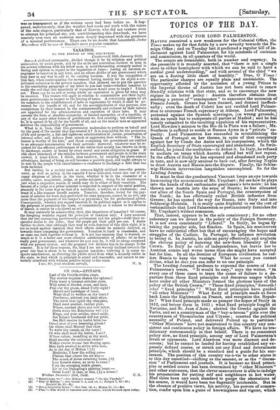TAXATION.
TO THE EDITOR OF THE SPECTATOR.
Camberwell, 10th January 1849.
Stet—A civilized community, divided though it be by religious and political animosities, by social grade, and by the strife and contention incident to man in his several relations with his fellow man, is notwithstanding strangely united in feeling and opinion in regard to the imposition of taxes ; having an extreme re- pugnance to taxation in any form, and an odious dislike of any government which may dare in any way to add to its existing burdens. It was the recognition of this fact, when contemplating the movement having mainly for its object a con- siderable reduction in our present taxation, that induced me to pat the question in the concluding paragraph of my letter to you last week—whether taxation be really the evil that this unanimity of repugnance would seem to imply? I think not. There can be no evil or wrong where an equivalent is given for what may be received. This truism will apply in relation to communities and their legiti- mate governments in respect to the levying of taxes. A community agrees by all its members to the establishment of laws or regulations by which it shall be go- verned for the benefit of Ill; and for the accomplishment of this purpose, men conspicuous by their interest in the commonwealth and eminent by their talents are appointed for the administration and execution of those laws. It may assume the form of absolute monarchy, or limited monarchy, or of a republic, or any of the many other forms of government we find existing; but whichever it be, it is agreed to by all for the benefit of all, and on the man or men so appointed devolves the responsibility of government.
What is it, then, that this government undertakes to perform on behalf and for the good of the society that has created it? It is responsible for the protection of life and property, a due and righteous administration of justice, preservation of internal order, and defence from attack or aggression from without. " The la- bourer is worthy of his hire," and those composing the government are entitled to an adequate remuneration for their services: moreover, whatever may be re- quired for the efficient performance of the ditties that society has thrown on them to discharge, society is bound by every moral and social obligation to grant. If
this short statement of the relation between government and i .people is in the main correct, it must follow, I think, that taxation, by securing the above-named advantages, instead of being an evil becomes a positive good, and ought always to be met by the people with cheerfulness—a readiness to discharge a debt that has been incurred.
But farther, in a society such as ours—a highly civilized one—the govern- ment, as well as acting in the capacity I have indicated, forms also one of the many divisions of labour in the state, whether it be in the character of a soldier, sailor, magistrate, judge, or prime minister; doing for its maintenance just what a carpenter, mason, or smith may do in either of their vocations. The income of a judge or a prime minister is expended in support of his social position, precisely in the same way as that of a merchant, a lawyer, or a tradesman ; and must in a like manner benefit society. Taxation, therefore, levied for the pay- ment of salaries for work duly performed for state purposes, cannot be an evil, any more than the payment of the lawyer's or physician's fee for professional advice. Consequently, whether you regard taxation in its political aspect as it applies to the of governing the state, or economically as it relates to the division of ur, it cannot be considered an evil. It may naturally be asked—why, then,. this impatience of taxation? Of course, the foregoing remarks regard the principle of taxation only. I have assumed that the two contracting parties—the government and the people—fulfil their re- spective duties to the state; that the people get their quid pro quo. I desire further to show, that although they may be even deprived of this their right, it is not so much against taxation that their efforts should be unitedly directed, as towards those composing the government. Taxation in itself is reasonable, and no state can hold together without it. It is not less taxation that is wanted, so much as it is a better and more effective administration of affairs: let us have really good government, and whatever its cost may be, it will be cheap compared with our present system, and the proposed few millions less in its charge to the country. It is for these reasons, Sir, that I am not warmly inclined towards the great stir that is about to be made against taxation ; believing it in many re- spects mischievous, as diverting the public mind from what is actually rotten in the state, to that which in principle is sound and reasonable, and cannot be ma- terially interfered with without positive injury to the state.


























 Previous page
Previous page